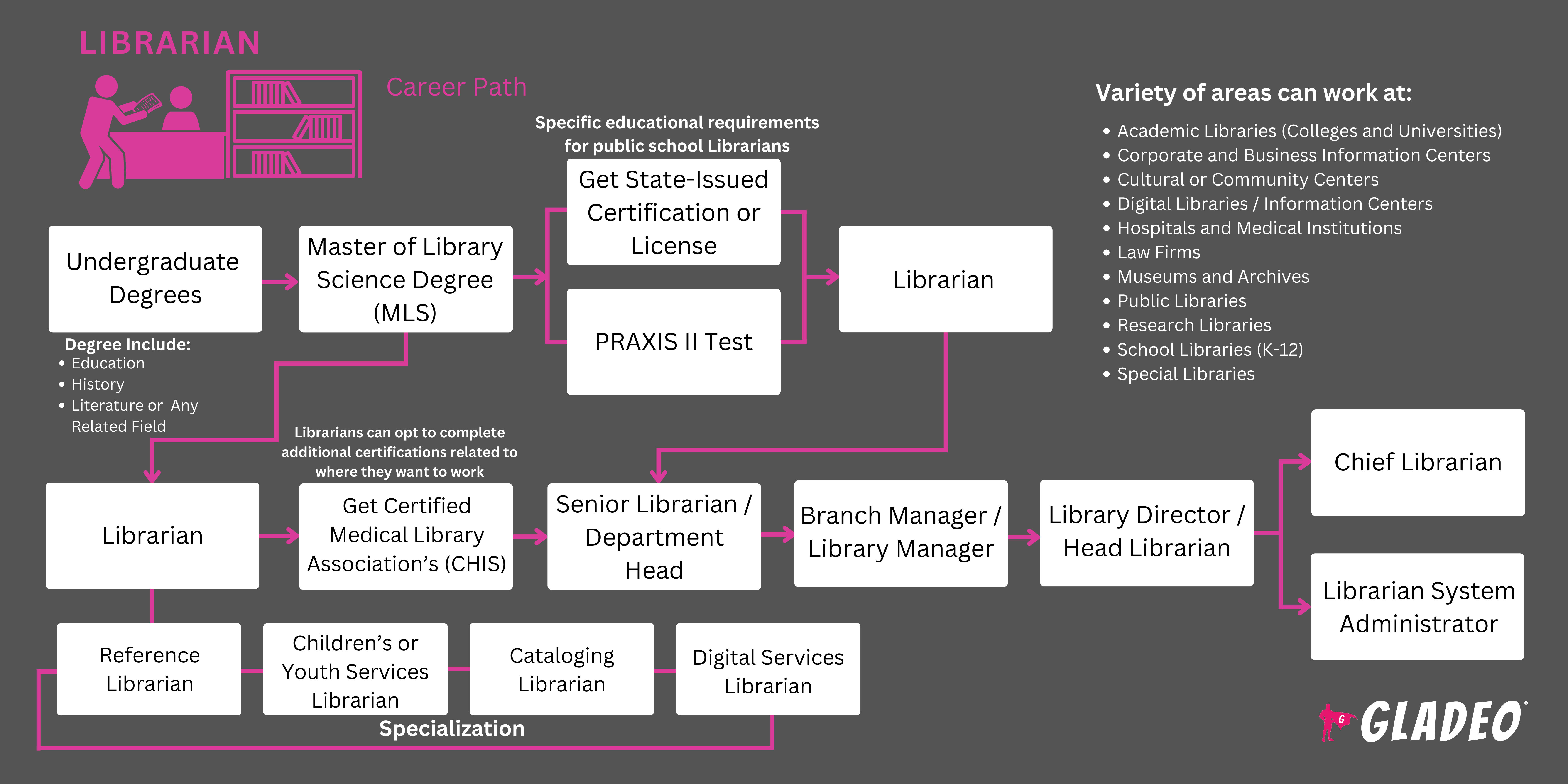Spotlights
Catalog Librarian, Instructional Technology Specialist, Library Media Specialist, Media Specialist, Media Technician, Multimedia Services Coordinator, Reference and Instruction Librarian, Reference Librarian, Technical Services Librarian
It seems like virtually all books and other media are now available at our fingertips, thanks to smart devices and WiFi. But physical libraries continue to be vital spaces within our communities and campuses, quiet places we can escape to for reading, learning, and engaging in hosted events. Librarians are the timeless keepers of these hallowed institutes where knowledge, critical thinking, and simply reading for pleasure are still valued and encouraged.
Librarians may work in a range of settings, including public libraries, school and college campus libraries, legal institutes, and healthcare facility libraries. They keep materials stocked and well-organized, so patrons can come in and easily find what they need. They also assist visitors looking for hard-to-find resources, which may be available in other forms of media. Librarians develop and host fun activities and learning programs for patrons of all ages to enjoy, helping bring together groups of people in a safe, common setting.
- Facilitating access to informational resources
- Helping promote learning and creativity
- Fostering a welcoming environment for families
Working Schedule
- Librarians work full-time, with many positions requiring weekend or nighttime work. Those who work on school campuses may be off during the same break periods as other employees. Some private company jobs may expect overtime.
Typical Duties
- Review catalogs and order inventory
- Curate a wide variety of materials of relevant interest for patrons, based on the function of the library (i.e., public, academic, legal, business, medical, etc.)
- Maintain an organized library database and system of reference
- Add incoming materials to the library database
- Apply call number labels to book spines
- Provide customer services, such as helping patrons find materials and resources
- Sign up patrons for library membership cards
- Check books and materials out to patrons, with assigned return due dates
- Check books and materials back into the system when returned, while assessing for damage
- Apply late fees or other charges, as needed
- Put items back on shelves
- Read book reviews and announcements
- Plan and manage budgets, as needed
- Order computer and other IT resources
- Ensure accessibility and compliance with Americans with Disabilities Act standards
- Manage online library resources
- Create recommended reading lists
- Work with vendors, as applicable
- Utilize interlibrary loan opportunities
- Ensure audiovisual equipment is in good working order
- Create and enforce library procedures and policies, such as rules for conduct
- Develop and plan programs and activities for the library to host
- Train and supervise library technicians, assistants, staff, and volunteers
Additional Responsibilities
- Design eye-catching displays that are suitable for patrons and the community
- Resolve problems with equipment, customer complaints, or worker disputes
- Liaison with management, government offices, or other organizations on various decisions
- Coordinate with building managers on maintenance, safety, and parking issues
Soft Skills
- Attention to detail
- Collaboration
- Communication skills
- Creativity
- Customer service
- Interpersonal skills
- Monitoring
- Organization skills
- Perceptiveness
- Problem-solving
- Sound judgment
- Time management
Technical Skills
- Knowledge of library software, such as CATNYP, Dynix Digital Library, Electronic Online Systems International, Ex Libris Group Voyager, Kelowna Software L4U, Online Computer Library Center, etc.
- Familiarity with budgeting
- Basic IT troubleshooting skills
- Public libraries
- College and university academic libraries
- K-12 academic libraries
- Special libraries
- National libraries
- Medical and legal institutions
On the surface, it might seem like a Librarian’s job is pretty straightforward. However, as shown in the Typical Duties section, they actually have a ton of different responsibilities! As a result, their days are filled with tasks ranging from the creative to the analytical and sometimes mundane. Few patrons realize how much effort goes into running a library, so it can be considered a sacrifice that most Librarians never have their hard work fully appreciated. Long before Google came along, Librarians empowered citizens with the tools and resources to learn virtually anything they wanted. And they still do!
Just as Amazon nearly killed the bookstore industry, it (along with Google) has also given libraries a run for their money. Today, almost any information or book can be either found online on a smartphone, tablet, or laptop. As a result, library services have become vastly overlooked.
Libraries provide free access to materials but also free computer resources, which many community members enjoy and rely on. The problem is when patrons are only coming to hop online but aren’t otherwise using library materials such as printed books (which are meant to be the “core resource” for public libraries).
Publishers Weekly, quoting the Freckle Report, states that “there has been a fall of 31% in public library building use over eight years.” The Covid pandemic didn’t help matters, as even regular library patrons shied away and turned to digital reading. On a positive note, the report highlights a “big opportunity for public libraries to lead the way forward in addressing diverse audiences and pulling the publishing industry with them.” The trick is finding strategies — and money — to bring patrons back to libraries in meaningful numbers.
Libraries exist for community members to come inside and find what they’re looking for. Thus, all Librarians should be “people persons” who excel at helping others.
Many are extroverted and enjoyed being part of busy school activities, showing leadership and organizational skills while under the spotlight. Others may have been more introverted and preferred diligently managing projects without any undue attention or fuss.
It’s probably safe to say that Librarians were likely big readers growing up. Having a love of books can prepare someone for working with and around books all day! Of course, that’s not to stereotype Librarians. There’s no one-size-fits-all personality type when it comes to this line of work.
- Librarians usually have a Master of Library Science (or a similar major) from a program accredited by the American Library Association
- There’s no specific undergraduate major required, but liberal arts bachelors are common
- Most states have specific educational requirements for public school Librarians, which may include holding a teacher’s certification plus passing a PRAXIS II test
- States have differing requirements for school Librarians, so it is important to check with applicable state departments of education
- Librarians can opt to complete additional certifications related to where they want to work, such as Medical Library Association’s Consumer Health Information Specialization - Level I
Librarians often finish undergraduate degrees in a liberal arts field like history, literature, or education. These degrees are very suitable for online and hybrid study. Graduates sign up for a Master of Library Science (or related program like Master of Information Studies or Master of Library and Information Studies). MLS programs should be accredited by the American Library Association.
Library science students have tons of educational opportunities, ranging from online and hybrid courses to full-time, on-campus programs at great schools around the country. You can use U.S. News’ Best Library and Information Studies Programs as a solid launch pad for your program search.
- Volunteer at your local school or public library!
- Volunteer for school activities where you can learn teamwork, leadership, conflict resolution, and project management
- Decide which type of library you’re most interested in working at
- Visit academic or special libraries near you. Ask if you can set up an informational interview with one of the Librarians there
- Stock up on classes related to economics, business, math, English, literature, speech, art, and marketing
- Apply for library-related internships
- Look for Library Science program scholarships to help take off the financial burden of school

- Apply for library-related internships to gain practical experience and make connections
- Consider starting out as a Library Assistant or Technician, while working on your degrees at night
- Sign up for alerts on popular job portals like ZipRecruiter, SimplyHired, Indeed, Monster, and Glassdoor
- Ask people in your network for tips about library job openings
- Move to where the jobs are! Per BLS, the states with the highest employment level for Librarians are New York, Texas, California, Florida, and Illinois
- Reach out to former professors and supervisors to see if they’ll serve as personal references
- Utilize your school’s career center for help with resumes and mock interviews
- Check out Librarian resume samples
- Make sure your resume is error-free, concise, and up-to-date. If requested, add a compelling cover letter that compliments the resume and showcases your personality
- Learn how to make an amazing first impression!
- Review Indeed’s How to Dress for an Interview
- Manage your library professionally and keep patrons satisfied
- Set goals for continual process improvement
- Manage your budget effectively and find ways to bring people in
- Keep honing your skills and stay up-to-date on trends. Learn what successful libraries are doing right, and avoid the habits of libraries that are struggling
- Sign up for additional certifications, as applicable
- Treat everyone with dignity and respect
- Build your reputation as the community or organization’s “go-to” resource
- Hold your staff to high standards and make sure they’re trained properly on tasks
- Have an action plan to deal with emergency situations
- Always stay calm under pressure, even if you’re confronted with an upset patron
- Have discussions with your supervisor about promotion or pay raise opportunities
- If needed to advance, apply for jobs with other libraries
Websites
- American Association of Law Libraries
- American Association of School Librarians
- American Library Association
- Association for Information Science and Technology
- Association for Library Collections and Technical Services
- Association for Library Service to Children
- Association of College and Research Libraries
- Association of Jewish Libraries
- Consortium of College and University Media Centers
- InfoComm International
- Medical Library Association
- Special Libraries Association
Books
- Librarian Tales: Funny, Strange, and Inspiring Dispatches from the Stacks, by William Ottens
- The Library: A Fragile History, by Andrew Pettegree, Arthur der Weduwen, et al.
- The Library: A World History, by James W. P. Campbell and Will Pryce
Many people say that being a Librarian isn’t a stressful job. After all, libraries are intentionally designed to be places of relative peace and quiet. Still, with so many duties and responsibilities, Librarians do have a full workload!
For those who want to explore a few similar career options, consider titles such as:
- Adult Basic and Secondary Education
- Archivists, Curators, and Museum Workers
- High School Teachers
- Instructional Coordinators
- Kindergarten and Elementary School Teachers
- Library Assistants
- Library Technicians and Assistants
- Middle School Teachers
- Postsecondary Teachers
Newsfeed

Featured Jobs

Online Courses and Tools

Annual Salary Expectations
New workers start around $75K. Median pay is $95K per year. Highly experienced workers can earn around $128K.
Annual Salary Expectations
New workers start around $88K. Median pay is $104K per year. Highly experienced workers can earn around $104K.
Annual Salary Expectations
New workers start around $85K. Median pay is $105K per year. Highly experienced workers can earn around $123K.
Annual Salary Expectations
New workers start around $63K. Median pay is $82K per year. Highly experienced workers can earn around $106K.
Annual Salary Expectations
New workers start around $80K. Median pay is $81K per year. Highly experienced workers can earn around $97K.
Annual Salary Expectations
New workers start around $51K. Median pay is $70K per year. Highly experienced workers can earn around $103K.







